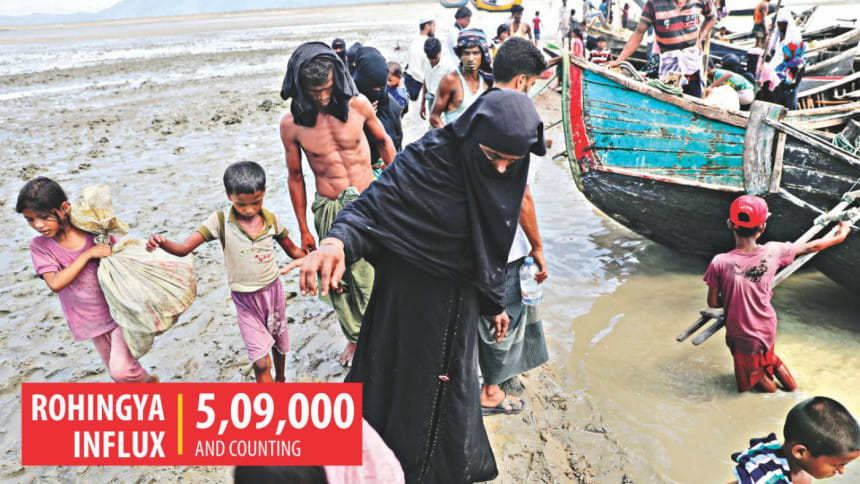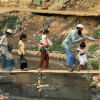Myanmar's Proposal: All that glitters is not gold

Myanmar's promise to take back the Rohingyas, who have taken refuge in Bangladesh, looks empty and seems to be a tactic to ease international pressure.
This is reflected in the contents of a hasty statement put on the official website of State Counsellor Aung San Suu Kyi hours after Myanmar Union Minister U Kyaw Zeya concluded his Dhaka visit.
The statement released yesterday clearly mentioned that repatriation has to be done on the basis of verification of the refugees in line with the criteria agreed to by the two countries in a joint statement in 1992.
And here comes the catch. If the 1992 agreement is followed, only around 14,000 may get the chance of repatriation, if at all. The reality is that more than five lakh Rohingyas have already arrived in Bangladesh over the last five weeks.
The mention of the 1992 agreement is devious and crafty. It's a clear indication that Myanmar is most insincere and unfeeling about the brutal genocide that is going on there.
The 1992 agreement was signed after an influx of more than 2.5 lakh fear-stricken Rohingyas who fled their country following a crackdown. After prolonged discussions, Myanmar agreed that the Rohingyas having "Myanmar citizenship identity cards or national registration cards or other relevant documents" issued by the authorities concerned could return to Myanmar.
But since then, things have changed in Myanmar, making it impossible for Rohingyas to meet these criteria.
The Myanmar government began a citizenship verification process in 2014 under the draconian 1982 law which deprived Rohingyas of citizenship. It allowed temporary resident cardholders to apply for citizenship on condition that they are listed as Bangalees.
But in 2015, the temporary resident cards were also cancelled, denying Rohingyas voting rights in the 2015 elections that saw Suu Kyi's return to power. Later in June that year, Myanmar started issuing Identity Cards of National Verification.
As the Kofi Annan Commission set up by Suu Kyi this year reports that around 4,000 Rohingyas out of one million have been recognised as citizens or naturalised citizens. Around 10,000 more Rohingyas got national verification cards considered as a preparatory step towards citizenship.
So Myanmar's proposal basically means it is not willing to take back more than these 14,000 registered Rohingyas. The rest will remain with us. Around one million Rohingyas have already taken shelter in Bangladesh -- five lakh entered this time and another five lakh in the previous years. They will remain a stateless people and multiply with stateless children.
The hollowness of the Myanmar union minister's proposal is also reflected in the simple fact that while he was holding talks with the Bangladesh foreign minister, more than 5,000 Rohingyas crossed into Bangladesh.
Myanmar has done nothing to stop genocide. It has not restrained its military. It has not stopped the extremist Buddhists who are at the forefront of the ethnic violence.
Its only aim was to shift the international community's focus and make the issue a matter of bilateral action.
There has been no reconciliation process in Myanmar that would make the refugees feel safe to return. Rather, their vacated lands and burned houses have been acquired by the Myanmar government.
The sad fact is that when Suu Kyi, who now says only the "verified citizens" would be allowed to return, has forgotten that while she was in prison, her party in 2005 had sought UN Security Council action against Myanmar for human rights violation and violence against ethnic communities after a commission headed by Nobel laureate Desmond Tutu and Czech President Vaclav Havel prepared a report on Myanmar.
Today, the same Suu Kyi doesn't consider the persecuted Rohingyas as humans worthy of returning to their own land.

 For all latest news, follow The Daily Star's Google News channel.
For all latest news, follow The Daily Star's Google News channel. 








Comments